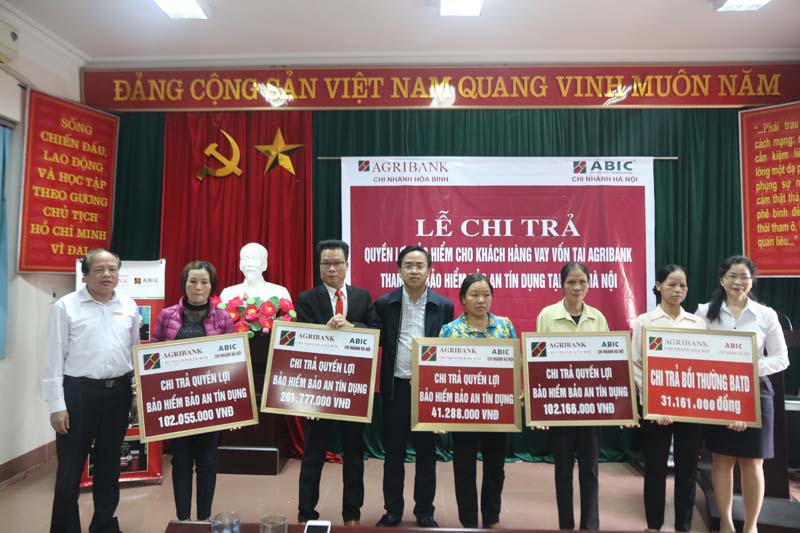
(HBO) – The Hanoi branch of the Agriculture Bank Insurance joint Stock Corporation (ABIC) has paid bancassurance compensations to the families of five dead clients of the Vietnam Bank for Agriculture and Rural Development (Agribank)’s branch in Kim Boi district. The customers joined ABIC credit insurance while borrowing loans from the Agribank. ABIC Hanoi and representatives of the borrowers’ families paid all the loans to Agribank Kim Boi.

Representatives from ABIC Hanoi, Agribank
Hoa Binh and Agribank Kim Boi paid compensations equivalent to 100 percent of
the loans to families of the dead clients.
The total bancassurance compensations that ABIC paid to the five families
were nearly 488 million VND (19,264 USD). Specifically, Bui Van Thieu’s family
in Nam Thuong commune received over 31 million VND; Bui Van Huynh’s in Vinh
Dong commune got over 41.2 million VN; Dinh Cong Tho’s in My Hoa commune was
paid 102 million VND; Bui Van Kien’s in Cuoi Ha commune got nearly 103 million
VND; and Tran Van Canh’s in Bo town received nearly 202 million VND.
According to a representative of the ABIC Hanoi, with
the deepest sympathies to the families of the dead clients of Agribank Kim Boi,
ABIC Hanoi paid 100 percent of the loans the customers borrowed from the bank.
ABIC Hanoi hopes to ease the difficulties and great loss that the families
face, helping them to stabilise and rise in economic development, said the
representative.
Since the credit insurance "Bao An Tin Dung” product
was launched in Kim Boi, the ABIC Hanoi has paid compensations totaling 2.8
billion VND to 125 customers.
In 2018, ABIC Hanoi compensated 22 families of clients
with 820 million VND. Currently, Agribank Kim Boi annually serves about 4,800
borrowers who also joined Bao An Tin Dung insurance provided by ABIC Hanoi.
The Department of Education and Training of Hoa Binh province held a conference on March 18 to review the performance of the "Safe and Happy School" Project and set out tasks for 2025. The project, funded by the Taiwan Fund for Children and Families (TFCF), aims to create a safe, inclusive, and supportive learning environment for students. The event saw the attendance of representatives from the TFCF and 26 beneficiary schools.
With over 70% of their workers being women, trade unions across industrial parks (IPs) in Hoa Binh have been actively safeguarding their legal rights and interests while implementing initiatives to improve their income and well-being.
In recent years, the Hoa Binh provincial General Hospital has continuously innovated itself and improved the quality of medical services to meet the increasing needs of local people. With substantial investments in infrastructure and modern equipment, along with a team of highly qualified doctors and nurses, the hospital has gradually established itself as one of the leading medical units in the Northwestern region and a trusted destination for healthcare for people inside and outside the province.
From mastering the fundamentals of programming to achieving national recognition, the Programming Club of the Le Van Tam Primary School (STAR LVT28) in Hoa Binh city has made remarkable strides in the field of robotics.
The Ho Chi Minh Communist Youth Union Committee and the Vietnam Youth Federation chapter of Hoa Binh province organised a programme on March 12 to launch the "Digital Literacy" movement and an online quiz on the resolutions of the Vietnam Youth Federation congresses at all levels, as well as the Politburo's Resolution No. 57-NQ/TW on breakthroughs in the development of science, technology, innovation, and national digital transformation.
As climate change grows more unpredictable, the development of production forests has become essential - not just for economic growth, but for safeguarding the environment and maintaining ecosystem balance. By boosting local incomes, curbing natural disasters, preventing soil erosion, and protecting water resources, these forests play a crucial role in sustainable development.



